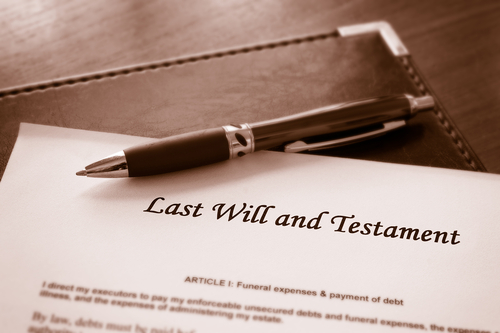When it comes to planning for the future, making a Will is often overlooked or considered unnecessary by many individuals. However, the truth is that creating a Will is a critical step in ensuring that your wishes are carried out according to your desires after you pass away. Lisa Ellis is a specialist in our wills team and writes about the importance of making a will.
WHY MAKE A WILL?
Whilst there are many important reasons to make a Will during your lifetime, we have set out below some important points to consider.
- Asset protection – inclusion of a trust arrangement in your Will
Protection from nursing home fees – many couples initially think they would like to leave everything to their spouse/partner and on the second death to their children/grandchildren. If the survivor has to go into nursing care and their assets exceed £23,250, they will have to pay for their care. Very quickly, cash assets are exhausted, and the property might have to be sold to fund their ongoing care.
The inclusion of a trust arrangement over your property ensures that the survivor will have the right to live in the property during their lifetime (or receive the income if it is rented out). If the survivor can no longer live at home and moves into nursing care, the share of the property or capital from any sale held in trust will be disregarded by the Local Authority when assessing care costs. When the trust comes to an end, usually when the survivor dies, the property passes to your chosen beneficiaries.
Blended families & protecting your children’s inheritance – there is an increasing number of couples who are marrying or remarrying with one or both parties having children from a previous relationship, often referred to as a “blended family”. If you die without making a Will, your estate will pass according to the statutory Intestacy Rules meaning your spouse/civil partner could inherit the whole or a large proportion of your estate. Depending on how you own your property, this could also pass outright to your surviving spouse.
Alternatively, you may have made, or are considering making, a Will leaving everything to your spouse/partner, but there is nothing to stop them from remarrying in the future and leaving their estate to that future spouse/partner or disinheriting your own children from their Will.
The inclusion of a trust arrangement, known as a “life interest of residue” affords your spouse/partner the right to receive the income from your Trust Fund and to continue living in the property during their lifetime. When your spouse/partner’s right to the income comes to an end, usually when they die, the Trust Fund will pass to your chosen beneficiaries. This will ensure your spouse/partner is provided for during their lifetime, but ultimately protects your chosen beneficiaries’ inheritance from circumstances that are beyond your control after you have died.
- Divorce proceedings
If you die without making a Will, your estate will pass in accordance with the statutory Intestacy Rules, meaning that until your divorce has been finalised, your spouse could potentially inherit the whole or a large proportion of your estate. Any property owned jointly as joint tenants will automatically pass to the surviving owner if the other owner dies. By severing the joint tenancy to tenants in common, this will allow you to leave your share of the property to your chosen beneficiaries. Further, you may have a Will in place which was made during your marriage in which gift your estate to your spouse.
It is therefore advisable to make or update an existing Will as soon as you separate or initiate divorce proceedings to ensure that your estate is protected for your chosen beneficiaries and does not unintentionally pass to your spouse.
- Appointment of a guardian for minor children
If you die leaving minor children and there is no surviving parent with parent responsibility, the courts will decide who will look after your children. It is not guaranteed that those appointed guardians would be the guardian of your choice. There is also a possibility that your children could be placed into care temporarily until such time the court appoints official guardians.
In your Will, you may appoint a legal guardian of your choice, who is very often a person you feel will be best placed to make decisions regarding your children’s upbringing, beliefs, education and general wellbeing. By ensuring the appointment of a trustworthy guardian is in place, this will no doubt offer some comfort to your children in what would no doubt be an extremely distressful and difficult time for them.
- Marriage/in contemplation of marriage
If you have a Will in place and later marry, your marriage will automatically revoke that Will. It is therefore a good idea to review your Will if you have married since making a Will. Alternatively, if you are in a relationship and want to make a Will, you can make a Will “in contemplation of marriage” which will prevent that Will from being void in the future if you do marry.
- Avoiding family disputes and peace of mind
By clearly outlining your wishes in a Will, you can minimise the potential for family disputes and conflicts over inheritance. It also serves to protect your assets from circumstances in the future which are beyond your control.
Your Will serves as a legally binding document that leaves no room for ambiguity or misunderstandings. Knowing you have a Will in place provides peace of mind, not only for you, but also for your loved ones. It ensures that your affairs will be taken care of according to your wishes, sparing your family from unnecessary stress during an already emotional time.

How can we help
We have a specialist team who will be happy to run through the options available and guide you through the next steps. If you are interested in making a new Will, please contact us on 01803 213251 or email [email protected] and a member of the team will be happy to help.
Lisa Ellis, Graduate Legal Executive
For advice from our specialist wills and probate team please contact one of our offices:
South Devon 01803 213251
Exeter 01392 274006
North Devon 01271 342268
Email : [email protected]
Wills, Probate & Private Client | Wollens Solicitors



